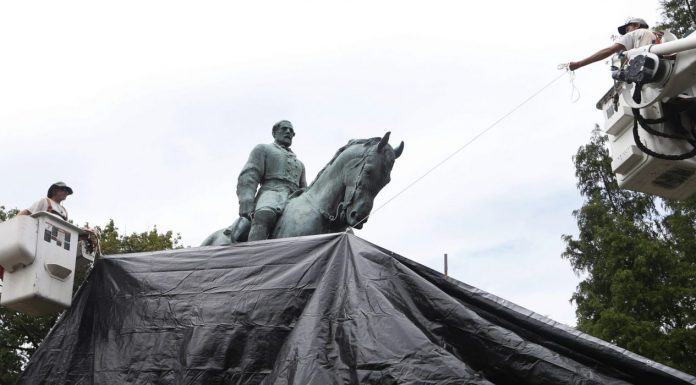(Headline USA) Capping off a legal battle that caught the attention of the world following a 2017 riot, Virginia‘s highest court ruled Thursday that the city of Charlottesville can take down a pair of century-old Confederate monuments.
The more-than four-year-long political dispute over the bronze statues of generals Robert E. Lee and Thomas J. “Stonewall” Jackson took roughly as long to resolve as the Civil War itself.
The radical leftist city‘s efforts to remove them—initially deemed a violation of state law—led to the violent clashes between right-wing and left-wing extremists, in which one activist standing in a crowd of people was run down by a 20-year-old protester who was trying to escape the melee.
Despite being covered with tarps, the statues withstood the initial removal efforts, as well as the 2017 riot and a subsequent cancel-culture push last year that felled other memorials to the rebellious Southern leaders.
But on Thursday, the state Supreme Court overturned a prior Circuit Court decision, which had been preventing their removal under a 1997 law that offered protections for historic monuments.
“The circuit court erred in failing to interpret the statute according to its plain language meaning,” State Supreme Court Justice Bernard Goodwyn wrote.
Critics claimed that the statues were archaic and were offensive to black descendants of slavery, a leading cause of Southern secession, which the two Virginia-born generals fought on behalf of. Lee, from a prominent Virginia family, was himself a slaveholder.
Jackson died during the war, while Lee—after overseeing the surrender of the Confederacy—eventually saw his American citizenship restored and became a university president.
Throughout the South, many monuments were resurrected by the Daughters of the Confederacy and other groups in the early 20th century, during a time of national reconciliation between the Civil War rivals that also saw renewed racial tension.
In 1918, Charlottesville had accepted a resident’s offer to donate land for parks for both of its statutes. The Jackson statue was erected in 1921, and the Lee statue was erected in 1924.
When Charlottesville’s city council voted to remove both statues in early 2017, a group of residents sued to block the city from taking them down.
Plaintiffs’ attorneys argued that a law enacted by the state’s General Assembly in 1997 prevented the city from removing the two Confederate statues. The city argued that the law couldn’t be applied retroactively and did not apply to statues that cities erected before 1997.
Goodwyn said both statues were erected long before the passage of a law regulating the “disturbance of or interference with” war memorials or monuments.
“In other words, [the law] did not provide the authority for the City to erect the Statues, and it does not prohibit the City from disturbing or interfering with them,” Goodwyn wrote.
S. Braxton Puryear, one of the attorneys for the residents who sued, said he hadn’t read the ruling yet and couldn’t immediately comment on it.
Frederick W. Payne, a Charlottesville lawyer who was listed as the lead plaintiff in the lawsuit seeking to block the statue’s removal, also declined comment Thursday.
A spokesman for the city of Charlottesville didn’t immediately respond to a call and email seeking comment on the court’s ruling.
The Virginia Division of the Sons of Confederate Veterans, Inc., and The Monument Fund, Inc., also were plaintiffs in the lawsuit filed against the city in March 2017.
The state Supreme Court also ruled that the circuit court erred in ordering the city to pay $365,000 in plaintiffs’ attorneys’ fees and costs.
University of Virginia law Richard Schragger, who specializes in the intersection of constitutional law and local government law, said he took the position early in the litigation that the law didn’t apply to the Charlottesville statues.
He expects Thursday’s decision to be the final word in the long-running case since he doesn’t see any grounds for a challenge under federal law.
“It has just taken a very long time for this to be resolved,” Schragger said. “I think the circuit court took probably too long to make make its rulings.”
The 1997 law that barred local governments from removing Confederate statues was repealed in 2020, after Democrats gained control of the General Assembly in the 2019 elections. Since then, local governments across the state have removed statues that stood for a century or more.
The new law does impose some requirements on local governments seeking to remove a statue, like holding a public hearing and offering the statue to a museum or historical society for possible relocation. In Thursday’s ruling, the judges indicate in a footnote that they are making their ruling based on the old law.
Virginia Attorney General Mark Herring, a Democrat, said he determined nearly four years ago that the law purporting to block removal of Confederate statues did not apply retroactively and “was not the blanket prohibition that its proponents had made it out to be.”
Thursday’s ruling “confirmed that we were right,” Herring added in a statement.
“I have worked hard to help remove poisonous Confederate propaganda from our publicly-owned spaces, because I believe it glorifies a false history and sends a dangerous and divisive message about who and what we value,” said Herrring, who admitted to having worn blackface in the wake of a 2019 scandal involving Gov. Ralph Northam’s racist yearbook photos.
In Richmond, city officials have removed numerous statues on the city’s famed Monument Avenue after they became a focal point of racial justice protests last summer. But a statue of Lee has not yet been removed; a lawsuit is under way to determine whether the statue, which sits on state property and is subject to an 1890 deed that purports to restrict its removal, can be taken down.
Adapted from reporting by the Associated Press

